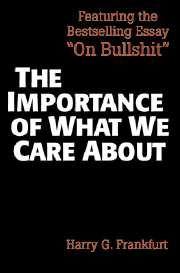Book contents
- Frontmatter
- Contents
- Preface
- Sources
- 1 Alternate possibilities and moral responsibility
- 2 Freedom of the will and the concept of a person
- 3 Coercion and moral responsibility
- 4 Three concepts of free action
- 5 Identification and externality
- 6 The problem of action
- 7 The importance of what we care about
- 8 What we are morally responsible for
- 9 Necessity and desire
- 10 On bullshit
- 11 Equality as a moral ideal
- 12 Identification and wholeheartedness
- 13 Rationality and the unthinkable
2 - Freedom of the will and the concept of a person
Published online by Cambridge University Press: 05 June 2012
- Frontmatter
- Contents
- Preface
- Sources
- 1 Alternate possibilities and moral responsibility
- 2 Freedom of the will and the concept of a person
- 3 Coercion and moral responsibility
- 4 Three concepts of free action
- 5 Identification and externality
- 6 The problem of action
- 7 The importance of what we care about
- 8 What we are morally responsible for
- 9 Necessity and desire
- 10 On bullshit
- 11 Equality as a moral ideal
- 12 Identification and wholeheartedness
- 13 Rationality and the unthinkable
Summary
What philosophers have lately come to accept as analysis of the concept of a person is not actually analysis of that concept at all. Strawson, whose usage represents the current standard, identifies the concept of a person as “the concept of a type of entity such that both predicates ascribing states of consciousness and predicates ascribing corporeal characteristics … are equally applicable to a single individual of that single type.” But there are many entities besides persons that have both mental and physical properties. As it happens – though it seems extraordinary that this should be so – there is no common English word for the type of entity Strawson has in mind, a type that includes not only human beings but animals of various lesser species as well. Still, this hardly justifies the misappropriation of a valuable philosophical term.
Whether the members of some animal species are persons is surely not to be settled merely by determining whether it is correct to apply to them, in addition to predicates ascribing corporeal characteristics, predicates that ascribe states of consciousness. It does violence to our language to endorse the application of the term “person” to those numerous creatures which do have both psychological and material properties but which are manifestly not persons in any normal sense of the word. This misuse of language is doubtless innocent of any theoretical error.
- Type
- Chapter
- Information
- The Importance of What We Care AboutPhilosophical Essays, pp. 11 - 25Publisher: Cambridge University PressPrint publication year: 1988
- 106
- Cited by



